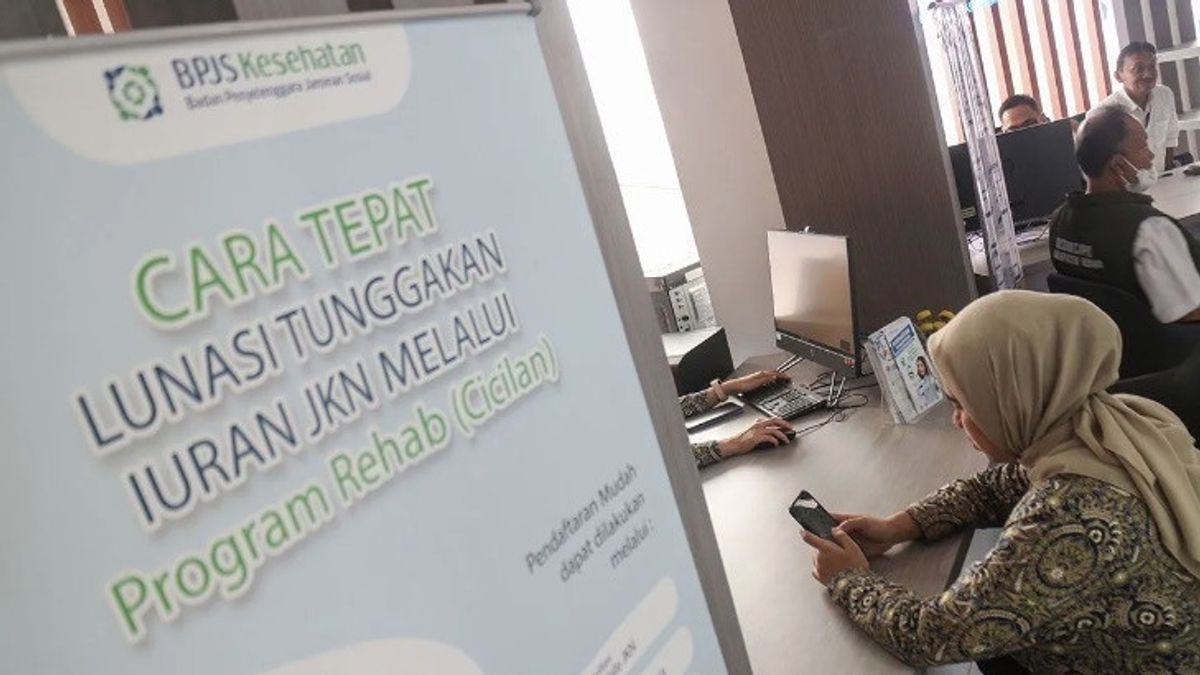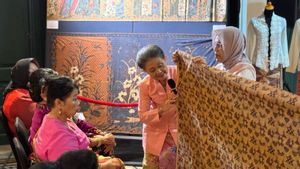JAKARTA BPJS Kesehatan is back in the spotlight, after his service was complained by senior musician Ikang Fawzi. BPJS Watch also criticized BPJS services.
Previously, it went viral on social media regarding Ikang Fawzi's complaint through his Instagram account.
In the video, it is explained that he must queue for approximately a good time when re-registered BPJS Kesehatan membership at the BPJS Health Service Office in the BSD Area, South Tangerang.
He came to the BPJS Kesehatan branch office because he wanted to change the status of the payment originally paid by the office to be paid independently.
He came accompanied by his daughter and admitted that he was willing to be patient in line from 09.00 WIB until 15.00 WIB.
"Hi, today I've been queuing at BPJS Kesehatan in South Tangerang, in South Tangerang BSD. Queuing from 9 o'clock and just getting (services) at 3's (sore)," said Ikang Fawzi.
Ikang Fawzi did not expect his upload to go viral. He even admitted that the head of the BPJS office came to his house to apologize for the incident.
PBJS Kesehatan President Director Ali Ghufron Mukti apologized for the unpleasant incident that happened to Ikang Fawzi. He said the incident experienced by Ikang on Monday (13/5/2024) occurred when there was a national system improvement. In addition, added at the previous weekend there was a long holiday The increase in Jesus Christ on May 9-12.
"It's been four days since we have been improving the system nationally since the holiday, not the working time, but because it's substantial, it will take a while to improve it, so four days, five days has just been completed," said Ali at the Presidential Palace Complex, Central Jakarta.
He also asked the public not to generalize the incident, because what happened to Marissa Haque's husband was situational and cassuistic.
What happened to Ikang Fawzi made BPJS Watch criticize BPJS services. BPJS Watch Social Security Advocacy Coordinator, Timboel Siregar said that online BPJS services should not be disturbed considering the public interest that could arise at any time.
"Public services do not see a period of collective holidays. The public must be provided with continuous services," Timboel said, citing Tempo.
In addition, Timboel also suggested that BPJS ask the Ministry of Health and the Ministry of Finance for additional budgets to improve the online operational service system. "BPJS must be managed with a very large and very good IT system," he said.
Timboel also said that BPJS should also have offline participant data reserves so that services can still be accessed when the online system is constrained.
Warganet responded to Ikang Fawzi in various responses. Not a few think that the singer of Catatan Si Boy wants to receive special treatment because his status is a public figure, but Ikang denies this. Not only that, but the public also suggested that Ikang Fawzi should use online services to re-register so that there is no need to queue at the BPJS office.
However, many claimed to have experienced the same thing as the 64-year-old man.
"Hahaha, yes, it's been a true experience when taking care of BPJS. Incidentally, celebrities are testimonials, so again they get attention from both the press and BPJS Health officials. I don't know how long services like this will be maintained," wrote @OniDewono on his Twitter account.
Ikang Fawzi's complaint against BPJS reminded the public about the policy of implementing the Standard Inpatient Class (KRIS), replacing the class system that had been in effect so far.
The KRIS system is in accordance with Presidential Regulation (Perpres) Number 59 of 2024 concerning the Third Amendment to Presidential Regulation Number 82 of 2018 of 2018 concerning Health Insurance. This is enforced to improve health quality services, because services based on classes in hospitals can vary. The KRIS system will also start effective on June 30, 2025.
But this new regulation sparked polemics among the community. Moreover, until now it is not known exactly how the dues that have been running so far are divided into three classes, namely grades 1, 2, and 3. In fact, the implementation of the KRIS system is intended to provide fair service to all BPJS participants.
Head of Public Relations of BPJS Kesehatan, Rizzky Anugerah, said that currently the contributions and class distributions still apply according to the previous Presidential Decree regarding health insurance. This means that the dues are still the same as those currently in effect.
However, on the other hand, Minister of Health Budi Gunadi Sadikin ensured that the BPJS Kesehatan contribution in the future would be one tariff after the implementation of the KRIS and carried out in stages.
"Now we are considering which class the dues will use. Actually, it will be final soon, really, and that's what BPJS also discussed with, also discussed with hospital associations," said Rizzky.
So far, BPJS Kesehatan participants are still divided into three classes with different inpatient services according to their number of contributions.
The monthly fee for class 1 is IDR 150 thousand; class 2 is IDR 100,000; and class 3 is IDR 42 thousand. In particular, lastly, there is a subsidy from the government of IDR 7 thousand, so class 3 participants only pay IDR 35 thousand.
The hasty implementation of the KRIS without improving the system is now considered quite risky, according to economist and Director of the Digital Center of Economic and Law Studies (Celios) Nailul Huda.
In fact, he considered, BPJS Kesehatan should have always implemented service equalization to all participants.
SEE ALSO:
"This service equalization should not be because of KRIS, but an obligation from the start. Whether or not there is a KRIS, health services for BPJS of any class are required to get optimal service," said Huda.
He also reminded that the implementation of the KRIS should not burden people who want to be hospitalized. "Secondly, what we are monitoring is the increase in contributions that must be adjusted to the level of availability to pay the community and the level of income. Currently, at a cost of approximately Rp. 1 thousand per day, it seems very appropriate. I hope there will be no additional costs," he said.
The English, Chinese, Japanese, Arabic, and French versions are automatically generated by the AI. So there may still be inaccuracies in translating, please always see Indonesian as our main language. (system supported by DigitalSiber.id)














